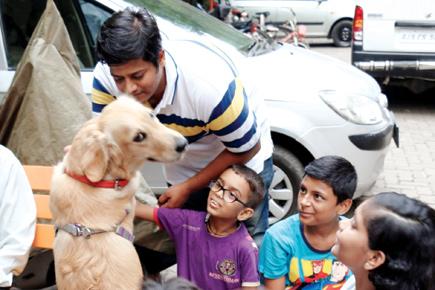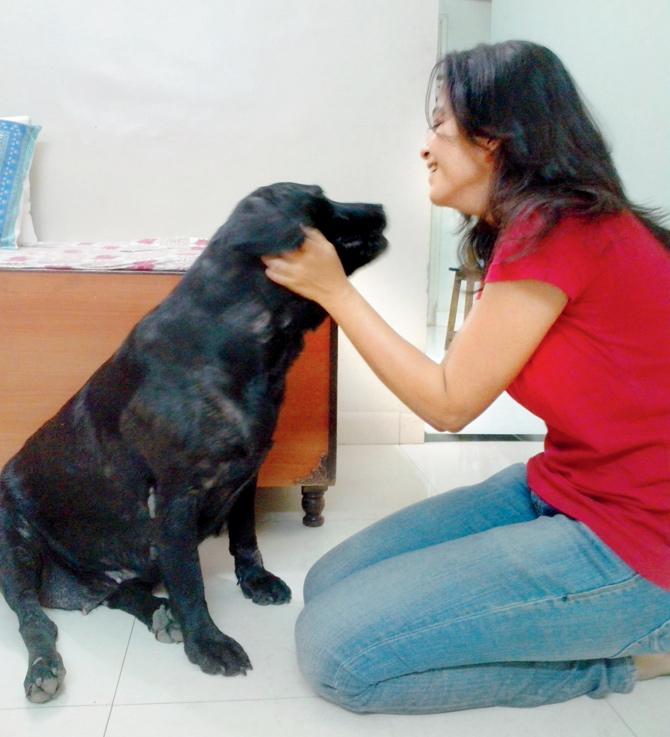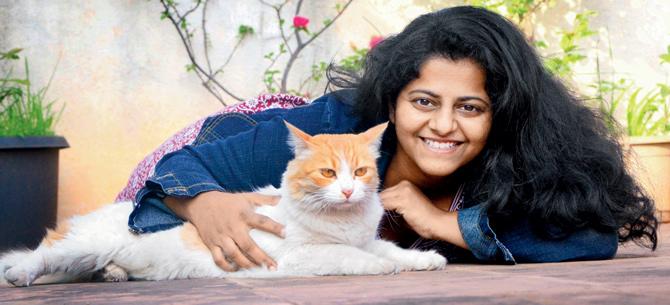Why sign up for an animal therapy session when your own pooch can turn doctor? Mumbai's pet parents are signing up their cats and dogs for assisted therapy classes

Akash Lonkar training six-month-old Pearl. Once she completes obedience classes, she will start with advanced therapy training which will involve being de-sensitised to loud noise, including crackers, and learning to be calm in strange environments
ADVERTISEMENT
Till a month ago, Pearl would suffer sleepless nights because of the traffic outside her Louis Wadi neighbourhood in Thane. The antics of the children in her colony would equally terrorise her, says parent Satish Kelkar, a former banker. But, all that’s changed since the six-month-old, Golden Retriever was enrolled at the Animal Angels Foundation, which trains animals in assisted therapy.

Akash Lonkar training six-month-old Pearl. Once she completes obedience classes, she will start with advanced therapy training which will involve being de-sensitised to loud noise, including crackers, and learning to be calm in strange environments. Pic/Swarali Purohit
"Not just does she sleep through traffic, she also allows the children to play with her. If a guest comes home, Pearl gives them a warm, no-bark welcome, instantly putting them at ease," says Kelkar, who, struck by his pooch’s incorrigible love for human company and her innate ability to comfort a person low in spirits, felt that enrolling her in therapy school could sharpen her talent. But, he doesn’t see her working as a therapy dog as of now. Not professionally, at least.

The 59-year-old, who noticed a sharp dip in his sugar levels in the time that Pearl has been with him, is happy having her help him and his wife, Neeta and play with the colony kids.
He joins a growing breed —pun intended — of pet parents who are increasingly seeking therapy training for their pooches not to employ, but better the experience.

Akash Lonkar, director of Animal Angels and a dog trainer for 10 years, is among the few trainers in India to trains dogs in animal-assisted therapy. Therapy animals work in schools, hospitals and nursing homes with children with special needs and patients. Taught to remain calm under pressing circumstances, their presence encourages the children and patients to stand up to challenges.

Minal Kavishwar, a certified animal-assisted therapist, has trained her cat, Cookie, in methods of positive reinforcement using treats
Lonkar says the difference between a pet trained in basic etiquette and one trained to be a therapy animal lies in the way they behave with family members and outsiders. "While a regular pet will obey commands from family members, he might not necessarily do the same with outsiders. He might not like it if a child came and pulled his tail or raised his ear and screamed into it. However, a therapy dog is trained to deal with this. He is even trained to be de-sensitised to crackers." Till date, Lonkar has trained 50 dogs to be therapy animals. While the cost of a session depends on number of classes and the place where the therapy is conducted, on an average, the cost for training ranges from R20,000 to R30,000. All training begins with obedience classes and lasts six to eight months, while advanced therapy training takes place over two to four months. After that, the pet is taken to the field in a real setting to test its ability.
Lonkar visits the Kelkar residence twice a week, training Pearl in both indoor and outdoor activities. While indoor activities include obedience and agility training, outside Pearl learns to bear the sound of passing vehicles, the shriek of children in the vicinity and strangers.
Not for all dogs
Mumbai-based dog behavourist, Shireen Merchant, says she gets 20 calls a week from pet parents keen to have their dogs trained. She, however, advices caution. Ask yourself, she says, if your pet tolerates human company or enjoys it. "Only if the dog enjoys the company of people thoroughly and actively seeks it, can it work as therapy animal. If the dog is simply tolerating people, and you sign up for therapy, you’re unwittingly increasing the dog’s stress levels."
Evey dog will first be put through a screening test to check if it is eligible.
Its traits — confidence, shyness, friendliness, aggressiveness, protectiveness, prey instincts, play drive, and self-defense instincts, and ability to distinguish between threatening and no threatening situations — are measured. For a dog to be eligible for training, it should not jump at new people or bark at strangers. It should maintain composure in new environments, say at a school or hospital.
Pearl, for instance, is a natural, with therapy dogs for biological parents. "That her pet parents are caring parents helps all the more," says Lonkar. Because working dogs belong to a family, even after they retire from professional life, they continue to work as therapy dogs in their own family setting.
"In most homes, there’ll be moments of discord, arguments, fights and depression. While there’s a chance that a pet might get affected by this, a therapy dog helps salvage the situation and comfort members," says Lonkar.
Helping out at home
Pune-based psychology student Aditi Bodas, who is parent to a 10-year-old therapy trained Labrador, says Ella has helped her tide through rough times.
"My mum remarried a couple of years ago and shuttles between her new home and this one. She is often stressed in the process. Having a therapy dog in the house is comforting," says Bodas. While all dogs can sense emotional highs and lows, Ella’s training helps her judge the situation and act accordingly.
"On occasions when I and my mother argue, instead of getting upset, Ella stays silent, gives us a look and walks away. As if she’s telling us to get over it," laughs Bodas, adding that the Lab snuggles up to her, when she’s low. "If I’m very upset, she’ll sit near me and nudge me with her paw till I feel comfortable enough to let her come closer. On some occasions, I place my head on my dog’s back, because that’s supposed to be therapeutic," says the 24-year-old who lives with her mother, younger sister, Ella and a cat.
Your feline can help too
Yes, you read it right. It seems even cats, with their seeming nonchalance, work well as therapy animals. Minal Kavishwar, a certified Animal Assisted Therapist from the University of North Texas and Delta Society, often uses cats as co-therapists in her practice. "Contrary to popular belief, cats can be trained in therapy. They work especially well in the field of relationships. Cats have a unique ability to purr and when they do, they emit vibrations that have a frequency to heal internally," she says.
Kavishwar has a six-year-old cat, Cookie, who she has trained through the methods of positive reinforcement and treats to be a therapy cat. "Obviously, not all cats make good therapy cats. Those who are calm, confident, friendly, and okay with unpredictable or new situations do well."
 Subscribe today by clicking the link and stay updated with the latest news!" Click here!
Subscribe today by clicking the link and stay updated with the latest news!" Click here!







